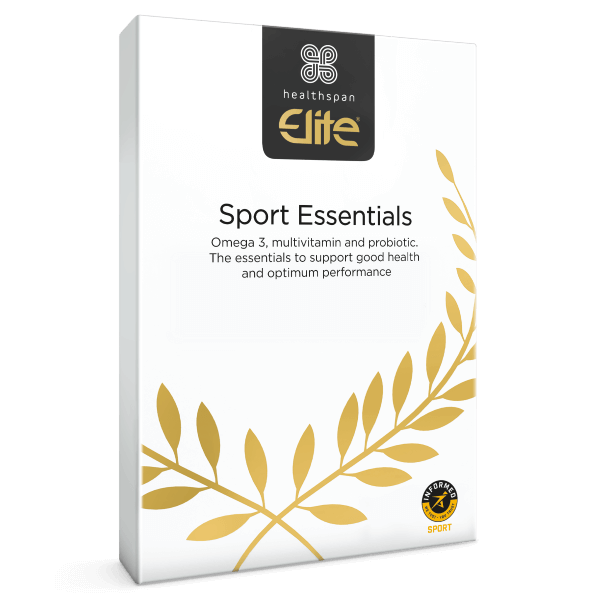The Six Nations is a busy time for the players, and for the people behind the scenes too. Richard Chessor, Scottish Rugby’s Lead Nutritionist, talks to Healthspan Elite to answer some of the most common questions on nutrition and supplementation in rugby.
What is your recommendation for the perfect match day meal, and how long before kick-off should you eat it?
We normally serve the pre-match meal 4 hours before kick-off and it remains available until 2 hours before kick-off to allow for different eating schedules. I prefer players to have a relatively small "top-up" meal at this time as we focus on eating a larger meal at breakfast or lunch. There is a wide variety of foods available from chicken and sweet potato to bolognese and porridge. Carbohydrate is the primary focus but we never ignore protein. A typical pre-match meal for a player would be a small bowl of clear soup, a small fillet of white fish with a moderate portion of rice and a banana for dessert.
Do your nutrition strategies change dependent on a player's position?
Not greatly. Each player follows the same pattern of eating but the amount and balance of foods will vary depending on the volume and intensity of training for that day. For example, in a unit session the backs may cover 4-5km so we educate them to increase their carbohydrate intake in the following meal to support recovery. However, the forwards may spend more time in the gym and therefore require a higher protein intake to support their greater muscle mass.
What is the biggest barrier to overcome to ensure players follow your nutrition plans?
Generally, the players are very receptive to our nutrition strategies so they don't need much encouragement to adopt them. However, not everyone is accomplished or confident in the kitchen so we work with players to ensure their domestic skills are up to scratch, from simple things like menu planning, generating shopping lists and cooking practicals, we try and ensure our nutrition plans are easy to apply.
What nutrition advice would you provide to an amateur rugby player?
Address your food environment first and foremost. Surround yourself by the foods that support your training and recovery and avoid the foods that don't. By addressing this it will make your meal and snack planning a lot easier and performance focussed.
There are a lot of different opinions regarding supplements in sport. Where do you stand?
We take a food-first approach with nutrition, so if we can use a food instead of a supplement then we will do. However, with the heavy training schedules that our players undertake we also need convenience and control, intelligent use of nutritional supplements allows us to achieve this.
How important are independent quality assurance programmes like Informed-Sport?
Absolutely vital. We will not have any products which have not been tested for the presence of banned substances in any of our locations.
With so many brands out there it must get tricky to choose the best products. What do you look for when choosing supplements?
We focus on 4 key questions when deciding on the use of a nutritional supplement:
- Is there a need for it?
- Is there clear scientific rationale behind its use and function?
- Are there any health risks associated with taking the product?
- Has it been subjected to rigorous banned substance testing?
The other key part is that no decisions on the use of nutritional supplements are ever made by one person. We have a group that regularly meets and scrutinises our existing strategies and discusses opportunities to introduce new products. This way we ensure that all new strategies are thoroughly researched and fit in appropriately to our existing programme.
Which supplements do you ensure your players take on a daily basis and why?
We ask the players to take three daily supplements:
- A Multivitamin: This is our 'nutrition insurance' to help prevent micronutrient deficiencies.
- A High Strength Omega 3: This supports recovery following exercise, joint health and general well-being through its anti-inflammatory effects.
- A High Strength Probiotic: Supporting optimal gut health is important for general well-being and sports performance and the probiotics help us achieve this.
Beyond these products we will use various supplements in line with different training sessions to support performance and recovery.
What would be your advice to young rugby players who are being told to bulk up or are considering using food supplements?
Focus on a consistent high quality diet alongside a suitable resistance training programme first. Supplements may help but will have an insignificant effect if you neglect your diet or hard-training. Gaining muscle mass is a slow process, so don't try and rush it with quick fixes. Make the focus on efficiency not outright size. We always prefer to have a strong and lean player than a big and immobile one.
We've been working together for nearly a year now, what made you choose Healthspan Elite?
To me, Healthspan Elite is synonymous with quality and efficacy which are key attributes of our nutrition programme. The extensive measures that Healthspan Elite take to ensure quality and safe products are produced is incredibly important in an industry where it is easy to cut corners. We trust them to deliver and they do.
During a period of competition such as the Six Nations, do you have to make any alterations to the players' nutrition plans?
We try to maintain the same strategies that the players are familiar with at their clubs (in particular Edinburgh Rugby and Glasgow Warriors). But, we are fortunate to be able to cater for the players throughout the majority of the week and therefore control the timing and contents of their meals. Most players say they end up eating more during the Six Nations than they normally would at home because the food is so good and there is always plenty available to them!
Scotland have got two away fixtures this year, does that extra travel effect what supplements you recommend to the players?
We try to keep the same strategies whether home or away. I will work extensively with the catering staff at the team hotels to ensure our menus are delivered to the high standards that we set.
With 6 games in such a short space of time there are bound to be a few injuries in the squad. What effect does this have on the players' nutrition?
With short turnaround times between games it means we have to be even more focused on employing the right nutrition strategies. From the final whistle of the France game everything a player eats and drinks will impact his ability to perform in the Wales game the following week. Therefore, if there are any weak links in the system we compromise performance. With regards to injured players, we treat each injury individually. If a player cannot train then we will work with him to decrease his food intake but ensure the necessary nutrients remain available to support healing.

Elite Sport Essentials
Three essential supplements to support good nutrition and optimum performance
- Multivitamin, omega 3 and probiotic
- Convenient daily tear strips
- Supports energy levels, recovery and digestive health










